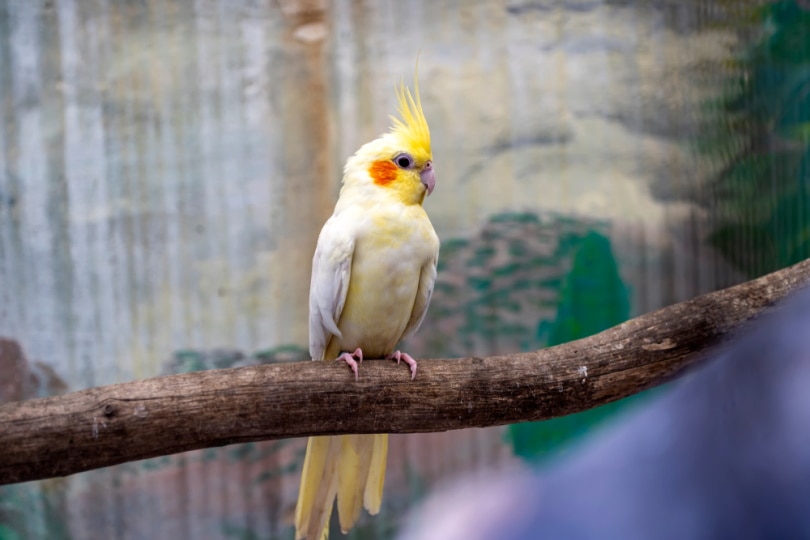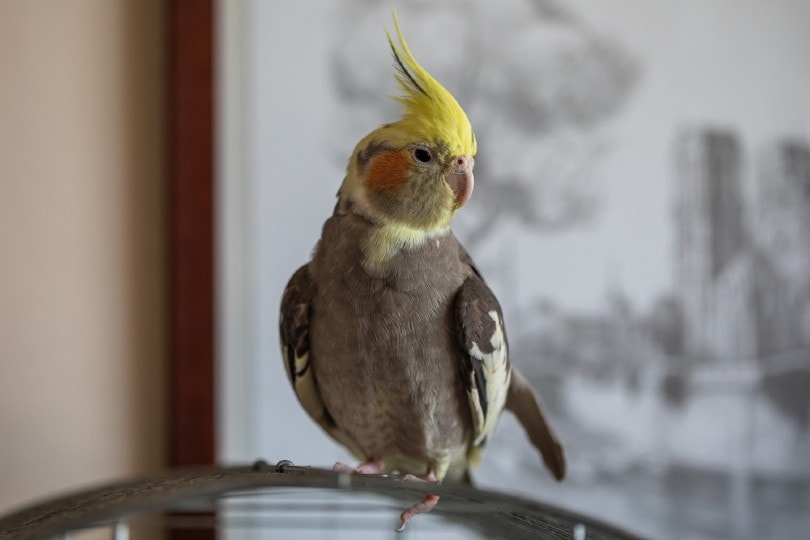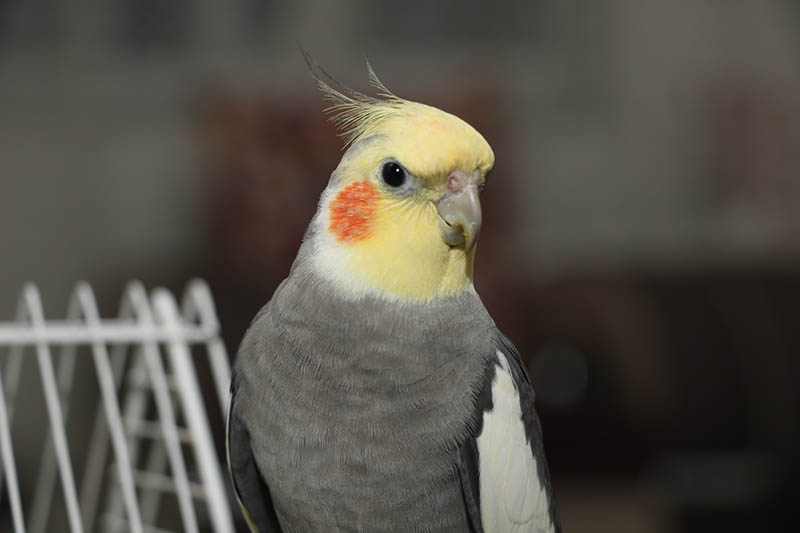Why Is My Cockatiel Screaming? 8 Vet Reviewed Reasons
Updated on
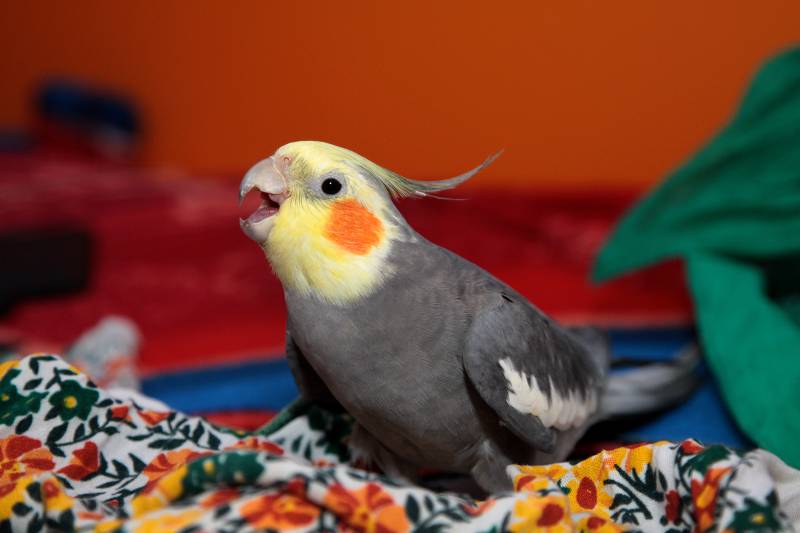
Cockatiels are among the most popular companion birds as they’re highly intelligent and affectionate. They can be taught to sing and mimic speech, but that’s just two of the many noises you’ll hear from your bird.
Cockatiels can be very noisy birds, but no sound is quite as annoying or worrying as a scream. If your cockatiel is screaming excessively and you have the headache to prove it, it’s worthwhile trying to investigate the cause. It may require a quick fix, like offering a meal or buying a new toy, but screaming can also indicate illness.
Read on to find eight likely reasons your cockatiel is screaming and learn what to do about it.
The 8 Reasons Why Cockatiels Scream
1. Boredom
Birds need a fair amount of mental and physical stimulation to stay happy and healthy. These smart birds need a lot of social contact and opportunities to fly and play. If your cockatiel is screaming excessively, your bird may be trying to tell you they’re not getting the enrichment they need.
To relieve boredom, buy your cockatiel new toys and make sure you’re rotating them out every week to keep things in their cage fresh and exciting. Provide them with things they can destroy. If you have the budget, these can be toys or even something like paper towel rolls can keep them entertained.
Foraging toys are another great investment as they are not only fun but rewarding, as they allow your bird to hone the natural skills they would use in the wild.
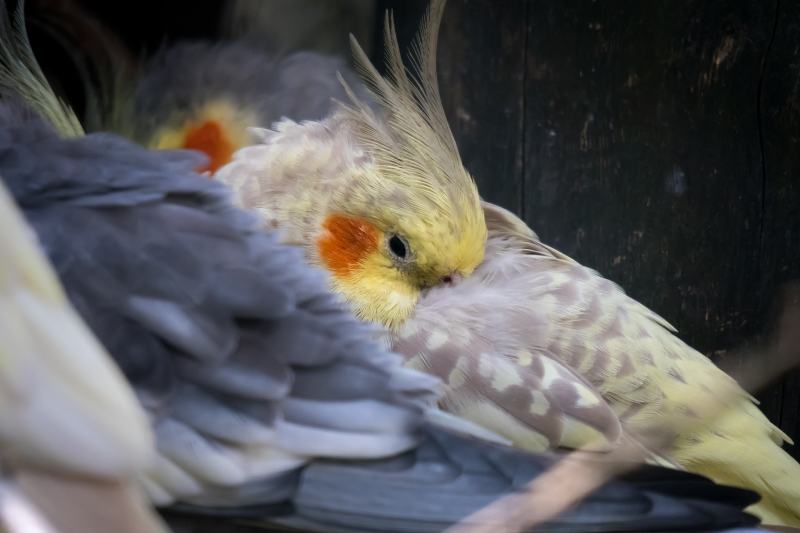
2. Fear
Your cockatiel might be screaming in fear, though this will often be accompanied by other signs such as pinning their eyes or having their crest raised.
There are a lot of seemingly innocuous things that could be frightening your pet. Even something as simple as adding a new painting in their room that they’re not used to can be enough to scare them. Remember, wild cockatiels are prey animals, and even if your pet doesn’t have to be afraid of hawks snatching them up from their cage, it is still coded into your pet’s DNA to be on the lookout for predators. Likewise, a new addition to their environment or unusual sound can be enough to send your bird over the edge.
If you notice that your bird is screaming more often at night, they may have a bout of night frights. Night frights are any disturbance that can cause a bird to get spooked or unnerved in the middle of the night. Some cockatiels with night frights will benefit from having a cover on their cage at night, so that’s something you can try if you believe this is what’s causing your bird’s nighttime screaming.
3. Stress
Many things in your cockatiel’s environment could be stressing them to the point where they resort to screaming for you to help.
This can include things like:
- Your bird’s cage not being big enough
- Too many male cockatiels kept together
- Sudden change in routine
- The adoption of a predator pet like a cat
4. Loneliness
Cockatiels are highly social animals. They’re used to living in flocks in the wild, so being alone all day in a cage can frustrate them. If your bird is screaming a lot when they’re alone, they could just be trying to tell you that they’re lonely.
Ensure you’re spending enough time with your cockatiel every day. Take your bird out of their cage to socialize and play with them as often as possible. Aim for at least one hour of interaction with your bird daily.
If your schedule doesn’t allow for that much playtime, you might consider adopting another cockatiel to keep your one company.
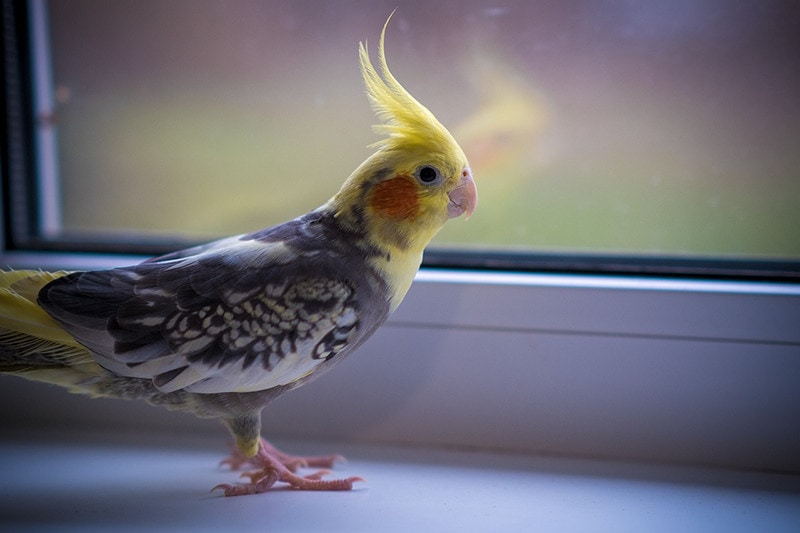
5. Illness
Cockatiels might scream if they’re feeling unwell. Typically, there would usually be other signs that your bird is sick, including:
- Changes in eating or drinking habits
- Fluffed feathers
- Drooping wings
- Weakness
- Lethargy
- Changes in behavior
- Closed eyes
- Nasal discharge
Birds are very good at upholding a strong and healthy appearance when sick. Unfortunately, by the time birds show signs of illness to their owners, they’ve likely been ill for some time. So, if your cockatiel is screaming more than usual and displaying out-of-character signs and behaviors, it might be time to take your bird to the vet for a check-up.
6. Attention Seeking
If your cockatiel wants your attention, they may not know how to get it other than by screaming.
Cockatiels in the wild will use a “flock call” to keep tabs on the other members of their flock. When you are noticeably absent, your cockatiel may start screaming to say, “Hey, where are you?” If you determine this is why your bird is screaming, send your bird back a flock call in return whenever you hear them calling for you. This will reassure your pet that you’re still nearby and have not fallen prey to predators.
7. Hunger
A hungry cockatiel is an unhappy cockatiel. If your pet hasn’t been getting the nutrition they require, they may start screaming to tell you they needs something.
Ensure you’re feeding a healthy diet with high-quality pellets and plenty of fresh fruit and vegetables. Your bird’s water dish should be refilled every day and sometimes more than once if you notice there’s food or droppings in their dish.
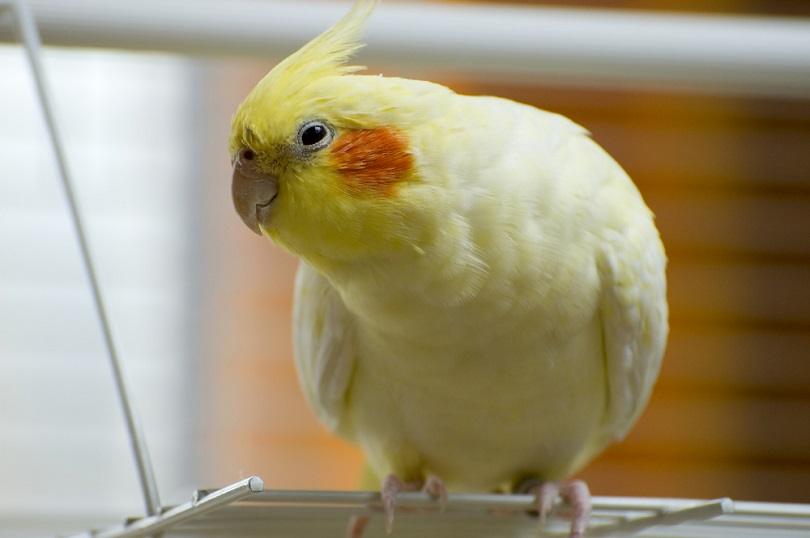
8. Lack of Sleep
Most cockatiels will sleep between 10 to 12 hours per day. So, if yours isn’t getting their beauty sleep, they could be screaming out of frustration and exhaustion.
To ensure your cockatiel gets the sleep they need, put their cage in a quiet room away from the house traffic. Even if you cover your bird’s enclosure at night, keeping your bird in a part of your house that gets a lot of traffic can mean they are not getting the right amount of sleep. Some cockatiel owners have a dedicated sleep cage they keep in a quiet room.
It would help if you also kept the blinds drawn in your bird’s sleeping room so your parrot can get the right amount of sleep without the sun waking them up too early. Keep the room at a comfortable temperature, and consider adding a night light if your cockatiel gets scared of the dark.
 The 3 Tips to Encourage Your Cockatiel to Scream Less
The 3 Tips to Encourage Your Cockatiel to Scream Less
1. Provide Stimulation
When you provide an ample amount of stimulation for your cockatiel, you’ll reduce their boredom and loneliness, which, hopefully, will also reduce their screaming. Your bird will be too busy playing with their toys or enjoying play time with you to be bored.
2. Train Your Cockatiel
The best but most challenging way to encourage your cockatiel to stop screaming is to train your bird. This can be done by rewarding good behavior (quietness) and ignoring them when they start screaming. If you constantly run to your bird or otherwise react to their screams, you’re telling them that that’s what they need to do to get your undivided attention. You should also note that attempting to engage in a screaming contest with your bird will not be productive.
It would help if you never shouted at your cockatiel for screaming. Though this behavior is undesirable, punishment is never the answer. If you know your bird is calling for attention and not because they’re sick or hungry, ignore their calls as best you can. Only once they’ve quieted down should you go to their cage and praise your bird for their silence. Cockatiels are highly intelligent and will soon learn that their quietness is what gets them the attention they craves.

3. Modify Their Environment
Environment modifications can also help silence the screaming. If your bird’s cage is in a noisy part of the house, their screams could be their idea of a flock call. Your bird will think they must be louder than the ambient room noise for the flock (AKA you) to hear them. They may scream to join in or compete with the background noise. Try moving their cage to a quiet, less busy room to see if that helps cut back on some screaming.
Final Thoughts
Cockatiels make fantastic pets, but they’re certainly not the quietest. If your cockatiel’s screaming drives you crazy, know you don’t have to live that way. Once you identify what is causing the screaming, make the required modifications to restore the peace in your home. Remember that praise goes a long way, so don’t forget to offer your bird a treat for a job well done.
Featured Image Credit: olanta Beinarovica, Shutterstock


 The 3 Tips to Encourage Your Cockatiel to Scream Less
The 3 Tips to Encourage Your Cockatiel to Scream Less